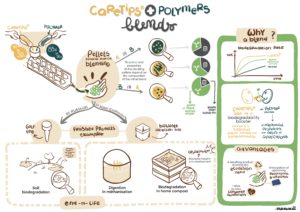The world as we know it doesn’t work without plastic, but that doesn’t mean we’re all familiar with the terms plastic, bioplastic, biosourced or even biodegradable material. A brief overview of these definitions:
The dictionary defines plastic as “a mixture containing a macromolecular substance as its fundamental component and that has usually been moulded or shaped”. A rather broad definition, encompassing materials that differ in nature, properties, end-of-life and origin.
With this in mind, bioplastic is a type of plastic that is either biosourced or biodegradable. Plastic is said to be biosourced if it comes from biomass resources, and biodegradable if it decomposes when in contact with living organisms. Combined, these two features make it what we call a renewable resource: in other words, a resource that can be reused after a “human” time cycle. But be careful: biosourced plastic is not necessarily biodegradable, and vice versa!
Under the terms of the “Single Use Plastics Directive” (2019/904/EU) and the REACH Regulation (1907/2006 EC), natural polymers such as our CareTips®️ pellets that have not been chemically modified are not considered to be “plastic”, and are therefore excluded from the scope of the Single Use Plastics Directive. So it’s a non-plastic plastic, both biosourced and fully biodegradable! It degrades quickly and completely, leaving absolutely no trace in the environment where it is used, whether water or soil.
In regard to this, if it is mixed with other plastics, it accelerates the disintegration process of the mixture. Lactips therefore offers a “blend” product, a true biodegradability booster with a higher biosourced component content.
Why is this interesting?
The Lactips solution anticipates future regulations and directives regarding the use of plastics, enabling the introduction of a product that meets the eco-design needs of its customers, while raising consumer awareness. The result is recycled polymers with enhanced biodegradability or biosourced content, and a lower rate of rejected microplastics, meaning better control of your product’s end-of-life.



